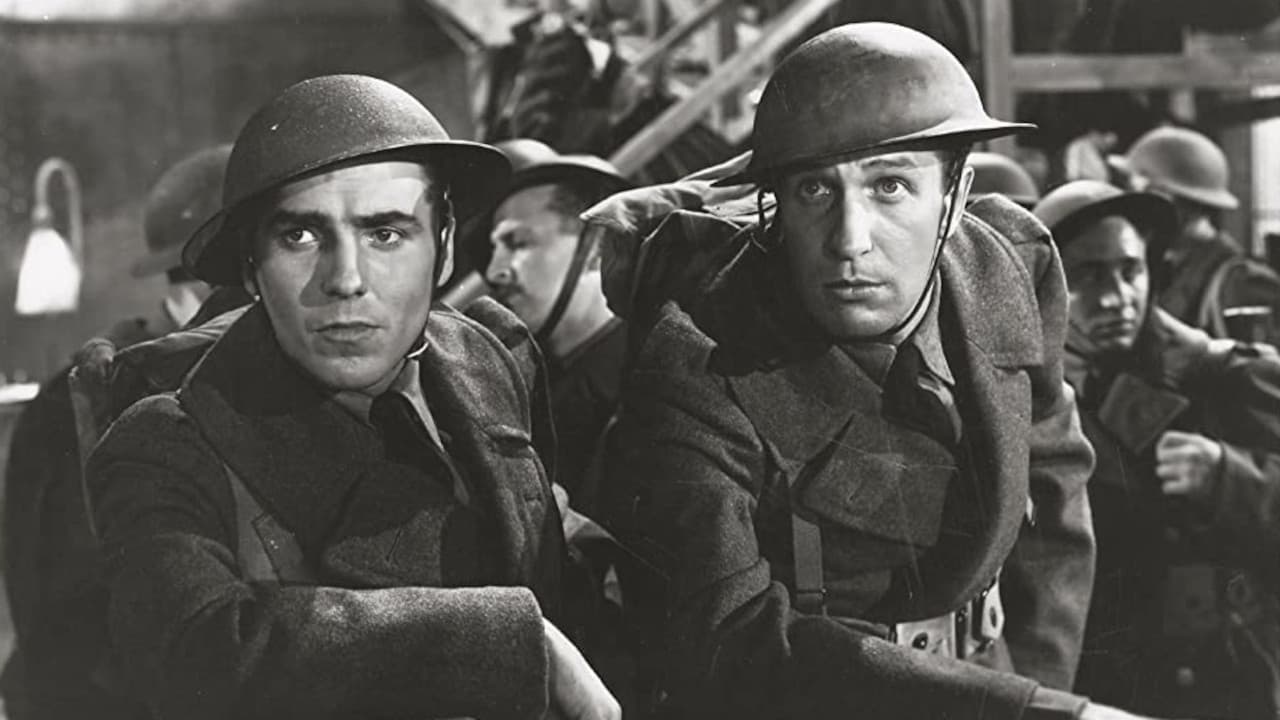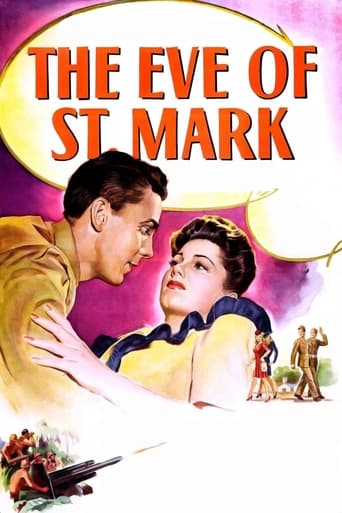

Legend has it that on the Eve of St. Mark's day, a maiden stepping into a church will see the people who will die the following year. It comes in handy when a group of soldiers marooned on a Philippine island fighting the Japanese, find themselves lost and probably dead in a short time.The story begins on a positive note as Quizz West, an eager young farm boy joins the army for a year stint. Coming home on a leave, Quizz brings along Janet, the girl he has fallen in love with, and who he will have to leave behind as he goes back. His parents, the Wests, are delighted with the choice; Quizz could not have elected a better person.As fate would have it, the Japanese attacked Pearl Harbor, resulting in prolonging Quizz's stint, but wanting to serve his country in the hour of need, he goes to the Pacific theater of operations with his company. The men bonded since training camp and keep fighting together. During that time most men contracted malaria. With short supplies, they have to deal with a debilitating disease and the Japanese air power in the Philippines.A seldom seen film based on a theater piece by Maxwell Anderson, and adapted for the screen by George Seaton. The film was entirely shot inside the 20th Century Fox studios in California. John Stahl, the director, shows great ways in which he opened the film, including the war sequences that are convincing if one realizes the constrains of the production. The valor of the men in battle, as well as the camaraderie in basic training.The achievement of Mr. Stahl in the film was the level of acting he got from the cast that was gathered for the picture. Anne Baxter shows up as the sweet Janet, the girlfriend from home. William Eythe, as Pvt. West showed promise. Best of all is Michael O'Shea, a wonderful actor doing an excellent take as Thomas Mulveroy, the devoted fan of his Brooklyn Dodgers. Seen in minor roles, Frank Morgan, Ruth Nelson, Ray Collins, Dickie Moore, and the excellent Vincent Price as Pvt. Marion.
... View MoreThe stage play origins of this badly-dated wartime propaganda film are plain to see - or hear. People talk endlessly, and for the main part the aim seems to be to show just how ordinary their characters are. That's all very laudable, but it doesn't exactly make for riveting cinema.William Eythe, one of Hollywood's blandest leading men - whose faltering career would drive him to alcoholic despair and an early grave - fails to grab our attention or empathy as a farm boy who finds himself battling with the Japs on some Philippine island. Although he's listed as the leading man, the status is nominal, and he finds himself struggling to stand out amongst an ensemble cast that includes the likes of Harry Morgan and Vincent Price. Morgan is the voice of doubt in the unit, who looks to the past when forming an opinion instead of acting for the future of the next generation; Price is an impoverished Southern aristocrat type, given to quoting Shakespeare at the drop of a hat; it's an eye-catching performance, although not, perhaps, for the right reasons. His southern accent is so weak it barely manages to crawl from his mouth before tripping from his lips with a dull thud.The story plays second fiddle to the morale-boosting philosophising of its characters, and too much talk means the pace drags badly. In the final reel, the propaganda is ladled on like a thick creamy soup with characters speaking lines that must have had the audience squirming even back then. Essentially, the final message is a call to the parents of the nation to pass the baton to the next generation and allow all their fuzzy-cheeked boys to place themselves in the firing line.
... View MoreThere's something nicely symmetrical in the fact that this movie was adapted from a play by Maxwell Anderson. Almost forgotten today Anderson began his career with the Broadway hit play What Price Glory (co-written with Lawrence Stallings). Produced in 1924 and twice filmed it was, of course, set in World War One and was a comedy about the love-hate relationship between Flagg and Quirt, sergeant and private. Twenty years on Anderson was more philosophical as perhaps befits someone with a penchant for writing in blank verse. He also turned his hand to writing lyrics and collaborated twice with composer Kurt Weill on Knickerbocker Holiday and Lost In The Stars, neither exactly laff riots though the former did produce the evergreen September Song. By 1944 the was was definitely swinging in the favour of the Allies but this didn't guarantee that no blood was spilled. Farmboy William Eythe is the main protagonist but both his family, sweetheart, and his platoon get plenty of screen time and equit themselves well, not least Ray Collins, usually a belligerent banker/politician but here subdued as Eythe's farmer father. Ann Baxter may be wasted as Eythe's girl back home but there is a nice ensemble feel to the whole thing. Dated, perhaps, but still worth a look.
... View MoreI doubt if Mr H.Morgan ever gave a poor performance throughout his long career - unfortunately the same cannot be said about Mr V.Price who veers wildly from ham to camp and back again in "The eve of St Mark" a 1944 propaganda picture designed to reassure moms,dads,sisters and wives that sending their menfolk off to war was a Good Thing. The ill - fated Mr W.Eythe is nominally the lead but Messrs Morgan and Price carry the main weight and are the polar opposite reasons that make the movie worth watching in a bizarrely fascinating sort of way. It may have satisfied American moviegoers at the time when the Invasion of Europe was on everybody's lips and the task of licking the Japs was dragging on a bit,but it's heart on sleeve appeal for patriotism and sacrifice fails to win many admirers in today's more cynical audience whose trust in Government and politicians has been sorely tried for many years. The usual cross section of white 1940s American Society -Country Boy,Tough Yank,Irish Rebel,Southern Aristo etc etc - end up on a Pacific Island debating whether to fight or run having failed to turn the tide against the Jap hordes who are now bombing the crxp out of them. Together with a "Doc" and a "Sarge",these boys are willing to go to hell and back for Uncle Sam by golly.But don't count on the "..and back" part. The folks back home,in touch by letter,decide in the end to allow their minor son to join the Air Force with their blessing,grinning bravely and getting down to the business of running their farm to keep America fighting. Mr Price manages to keep a straight face if not a Southern Accent as he mangles Shakespeare.Mr Morgan,rather more pragmatic, expresses doubts as to whether things will ever be different for the working man - you've got that about right Harry. In the end the boys decide to fight on(phew!). In the meantime the real G.I.s waiting in their bases in England to die in their thousands liberating a Europe that only too soon would be endeavouring to minimise their sacrifice for reasons of nationalistic realpolitik,and holed up in Japanese held islands in a disease - ridden nightmare would have laughed "The eve of St Mark" off the screen. No high - falutin' speeches required,no bristle - jawed cynicism,just the desire to get on with the job and go home.Maybe to mom and dad's farm,maybe to the factory floor or the faded grandeur of the Old South. And the overwhelming urge to kick Mr V.Price's precious arse.
... View More